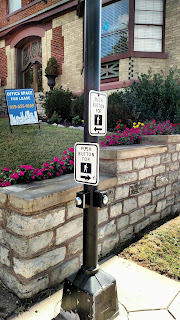The ABC's of Button Pushers
We went exploring today, just my youngest two boys and myself. This doesn't happen very often - just the three of us, and I was thankful for the 'mom' time, while dad was away in Iowa, flying his combat RC planes. We all need some time doing things that restore and renew us.
With construction surrounding the parking garage, and the Cincinnati football game taking up prime parking, we had quite the detour in walking to our destination to view the replica ships (Nina and Pinta) docked on the Ohio River.
I didn't mind it, it was a moderate 71 degrees outside with partially cloudy skies and plenty of sunshine. (I add that meteorological detail for the benefit of my PLN, as we span 10 time zones and love to fill each other in on the weather - and gas prices).
My youngest had been rowdy to the point of obnoxious all morning. Oh, please - I say that with all the motherly love in the world. In fact we almost didn't make it out of the driveway without yet another warning - to C A L M down!
As we approached the crosswalk pictured above - he started .... "push the button, the button, the button, the button". As I pushed it - I said aloud: "oh, you've been pushing my buttons all day". He knows what I meant by that - and no, he really doesn't do it on purpose, or with ill intent, it's part of his unique personality.
However, we do have some button pushers that we all work with: and I'd like to describe them~
[I am not describing real people I know or currently work with. In fact I may have even fit these profiles at one time or another. The intent of labeling these types of people, is for reflection and growth). These are merely stereotypes suggestions on how to work with them]
A) The passive controller: pushing the email send button
They like to forward emails to you about things that they think you should be aware of [click].
If you don't respond in a timely fashion, they will reply asking if you received it (sure - it's in my inbox of 13,503 emails) - and wonder when you will respond [click].
They might even refer to said email during a meeting with others - gently nudging you to publicly commit to something you haven't had time to process- yet {click click}
B) The honker: pushing the horn loud and clear
When you aren't moving as fast as they think you should - HONK!
When you put the brakes on -when they think you should proceed forward - HONK!
You sent a reply to a pending question and it was cc'd to others to join in on the conversation because your response wasn't adequate - HONK HONK!
C) The CAPS LOCKER: clicking - and overusing the caps lock button
They like to capitalize words - a lot! If caps indicate louder volumes when talking, then they practically yell at you - to you - too often. This breach of your phonic bubble space, may push your emotions to places that they shouldn't go in the work place.
Not EVERYTHING is THAT important - we get your drift!
So back to my son - the literal and figurative button pusher. He doesn't fit any of these three descriptions because he is just well - different. However understanding his story and what makes him different allows me not to take his idiosyncrasies to as a personal affront.
So let's seek to understand the work place button pushers:
A) The passive controller doesn't necessarily undervalue you or your leadership, they are just used to getting things done, in their own manner and timeline. I've learned to address their requests/suggestions/questions with a face to face meeting/phone call because it provides them with more feedback and detailed responses - quicker than I could type an email.
B) The Honker - get's my attention, serving their purpose but not necessarily mine. I've found that in these situations, Honkers have a set of underutilized skills. I take the time to understand those strengths (The Multiplier Effect principles in action) and guess what - they honk a little quieter and less often.
C) The CAPS locker - urgent flag user usually doesn't understand why their sense of urgency isn't shared. This is when transparency for understanding the process or procedures - or sharing of timelines of things comes in handy. Why can't I call everyone I need in for a meeting tomorrow ? Well because we have to work around everyone's schedules - but let me offer an initial meeting with just me, or a virtual meeting - or Vox the whole story so we understand the situation before we meet. People need to feel heard, and understood - but the value we place on items will not always be mutually shared. And that's ok!
I would love to hear about other types of button pushers you interact with - and how you have learned to have more positive interactions with them.




Comments
Post a Comment